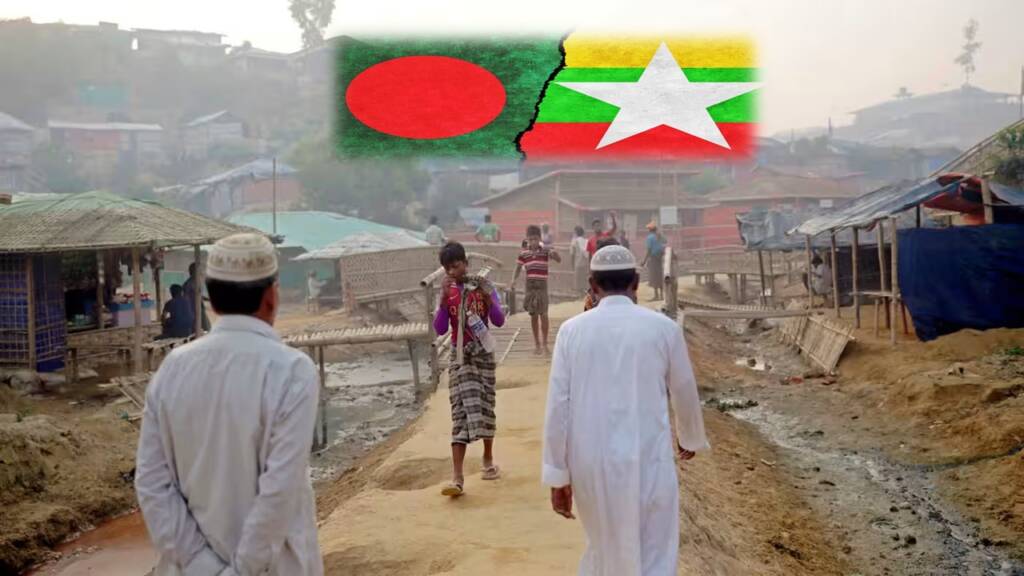Bangladesh is currently under increasing pressure to accommodate additional Rohingya Muslims escaping the ongoing civil war in neighboring Myanmar. The government in Dhaka, however, maintains that it is unable to bear this additional burden. Along the shared border, numerous Rohingyas have gathered, seeking refuge amidst the conflict between Myanmar’s military regime and a robust resistance offensive. Mostafa Mohammad Sazzad Hossain, a spokesperson for the United Nations High Commissioner for Refugees in Dhaka, emphasized the crucial need for allowing civilians, including children, women, and men, to seek and access safety. He pointed out that denying access to safety further exposes them to risks.
Despite these concerns, the Bangladeshi government remains steadfast in its position, citing the already significant hosting of over a million Rohingya refugees as a limiting factor in accepting more.
Join us on Telegram: https://t.me/tfiglobal
During a meeting of the National Task Force on Forcibly Displaced Myanmar Nationals in Dhaka on February 14, Sumbul Rizvi, the UNHCR’s representative, urged Bangladesh to consider accepting 900 Rohingya individuals waiting at 19 different border points, citing humanitarian reasons. Officials from Bangladesh’s Foreign Ministry relayed this request.
Sources familiar with the discussions revealed that Foreign Secretary Masud Bin Momen declined the proposal, referring to recent consistent statements from various ministers asserting the non-acceptance of additional Rohingya refugees.
“We will not allow any more Rohingya to enter the country,” Obaidul Quader, the minister of road transport and bridges, told reporters earlier this month. “They have already become a burden for us,” he added, stressing that international aid had declined. “How long can we support them?”
In response, Mostafa Mohammad Sazzad Hossain of the UNHCR affirmed, “We continue to advocate with Bangladesh authorities, in Dhaka and Cox’s Bazar, to enable civilians fleeing conflict in Myanmar, Rohingyas and non-Rohingyas, access to safety.” Highlighting the concentration of Rohingya refugees in Cox’s Bazar camps, he assured that the UN refugee agency and its partners are committed to providing support for any new arrivals.
Bangladesh faces a dual challenge as it perceives the existing refugee population as both a financial burden and a security issue. The desire to repatriate them, however, has encountered obstacles, primarily due to concerns about their safety. Approximately 700,000 refugees sought shelter in Bangladesh in 2017, escaping a severe military crackdown that a United Nations fact-finding team characterized as having “genocidal intent,” a claim refuted by Naypyitaw.
Read More: SLAPP Fear: Thai Military Suppresses Malay-Muslim Voices
The prospect of repatriation becomes increasingly remote as two-thirds of Myanmar grapples with ongoing conflicts, as reported by the United Nations. Recent events saw approximately 330 Myanmar nationals, including regime forces and civilians, crossing into Bangladesh to escape Arakan Army attacks near the border with Bandarban and Cox’s Bazar districts. Myanmar repatriated them on February 15, eliciting strong protests from Bangladesh, aggravated further by stray gunfire encroaching on its territory.
As conditions deteriorate within Myanmar, concerns mount not only for Bangladesh but also for neighboring countries. Donald Lu, U.S. Assistant Secretary for South and Central Asia, expressed apprehensions on Saturday regarding the risks posed to Bangladesh and India arising from the Rohingya crisis and the persistent conflict.
Expressing concerns about the situation in Myanmar, Donald Lu, U.S. Assistant Secretary for South and Central Asia, said at a United States Institute of Peace event, “The situation there [in Myanmar] doesn’t appear to be getting better and what worries me is that this refugee crisis, the security problems that it’s creating for Bangladesh and potentially for India as well, could get deeper in the coming days,” marking the second anniversary of President Joe Biden’s Indo-Pacific Strategy.
Read More: China’s FDI Hits 30-Year Low: What’s Driving the Exodus?
Former Bangladesh Ambassador to China, Munshi Faiz Ahmed, asserts that despite international pressure, Bangladesh should refrain from accepting more Rohingya individuals. Ahmed contends that the country has already sheltered Rohingyas beyond its capacity and sees repatriation as unlikely without a change in regime and restoration of peace in Myanmar.
Security analyst and retired brigadier general, M. Shakhawat Hussain, views the refugee crisis as a prolonged challenge for Bangladesh. He advocates for novel approaches, proposing that Bangladesh should seek assistance from the International Red Cross to establish a safe zone within Myanmar. This, he suggests, would prevent Myanmar nationals from being compelled to flee towards Bangladesh, offering a potential solution to the ongoing predicament.
In the face of escalating pressure, Bangladesh steadfastly rejects accepting additional Rohingya refugees, citing existing challenges and emphasizing financial and security concerns. As the crisis deepens, calls for innovative solutions arise, with experts proposing international cooperation and the establishment of safe zones within Myanmar.
